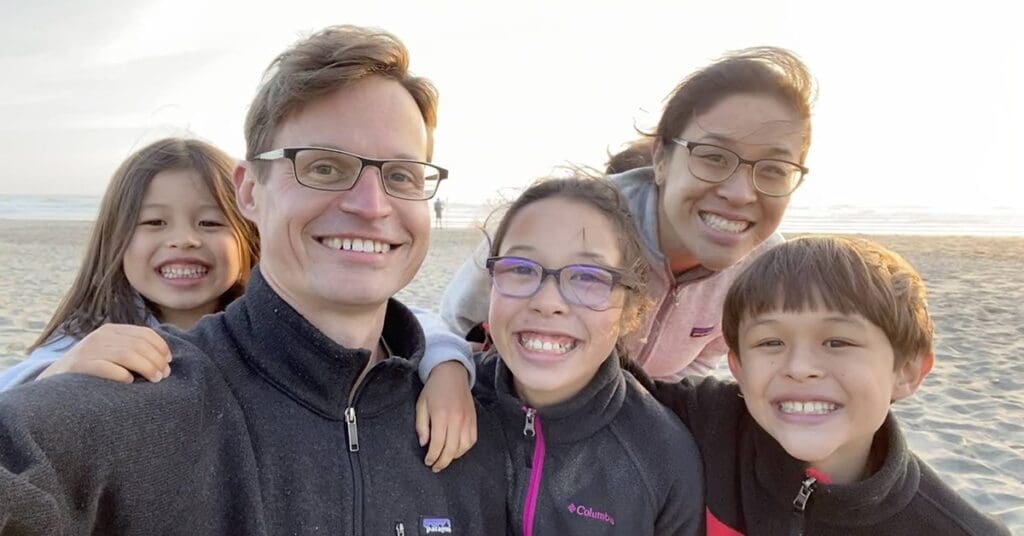Caption: (Right) Lia Moriguchi Halasz, MD, and (Left) Molly Havard Blau, MD, radiation oncology resident, at the The Seattle Cancer Care Alliance Proton Therapy Center. (Photo taken before the COVID-19 pandemic.)
Lia Moriguchi Halasz, MD, joined UW Medicine in September 2011. Halasz is a radiation oncologist at UW Medical Center – Montlake and Harborview Medical Center, and is a UW School of Medicine associate professor of radiation oncology with a joint appointment in neurological surgery. She is co-director of the Alvord Brain Tumor Center.
Halasz cares for patients with brain and spinal cord tumors. Her clinical research interests include brain tumor outcomes, quality of life and innovative radiation technologies.
Let’s Get to Know Her:
Q: What were you doing before you came to UW Medicine?
A: I grew up in south Seattle and graduated from Garfield High School. At age 18, I moved to Massachusetts to attend Harvard for college and stayed for medical school and residency. Boston was quite a switch from what was then small-town Seattle — it was colder, louder and with more jaywalking — but I had a great time.
After finishing radiation oncology residency, I joined UW School of Medicine as an assistant professor.
Q: What made you want to become a doctor, and in your specialty?
A: In college, I volunteered to help underserved families connect with social service resources at the city hospital. I really enjoyed working with people and problem-solving, which led to my interest in medicine.
When I got to medical school, oncology was a natural fit. I’ve always been drawn to working closely with patients and families to figure out what they need most. In radiation oncology, we design treatments customized to an individual patient’s anatomy, disease and goals for care.
Q: Why did you decide to join UW Medicine?
A: UW Medicine has always had a great reputation for oncology care and research. As a college student, I took part in a summer internship program at Fred Hutchinson Cancer Research Center, which introduced me to exciting research. After I finished training, I was lucky that our department was looking for a faculty member to specialize in neuro-radiation oncology.
It was a great fit since our department was building a new proton center, The Seattle Cancer Care Alliance Proton Therapy Center, when I joined, and I had trained in this technology at Massachusetts General Hospital. When I was in Boston, we had many patients from the northwest who traveled there for proton therapy. Now, I have the opportunity to offer this specialized care to the community I grew up in.
Q: How has your family adjusted moving from Massachusetts to Washington?
A: For me, it was a natural move as Washington was my original home. My husband has adjusted well, embracing the winters by biking in the rain and skiing in the mountains.
Q: What’s something that most people don’t know about you?
A: I come from two large families, one Japanese American and one Chinese American. I have 34 first cousins, and most of them live in the Seattle area. My husband also comes from a big family. Our family get-togethers are big and noisy!
Q: What do you like to do when you’re not working?
A: My husband and I like to take our three kids, aged 6 to 11, hiking or skiing in the Cascades. We also enjoy biking around Lake Washington with my sister’s family.

Halasz camping at Kalaloch National Park with her family.
Before COVID-19, we loved getting together for big family meals. Now, we are steaming frozen dumplings from several different Chinese restaurants trying to find the best. So far, our favorites have been from Dumpling Generation in Edmonds.
I also love music, enjoying everything from ’90s hip-hop to the symphony. In years past, my husband and I have had season tickets to the Seattle Opera. With live performances canceled, we are watching reruns of “Rhythm + Flow” on Netflix.
Q: What are your areas of interest within radiation oncology?
A: I specialize in caring for patients with brain, skull base, and spinal cord tumors, as well as metastatic disease of the brain and spine. My research centers around advanced radiation techniques and the health disparities surrounding their use, as well as their associated outcomes for primary and metastatic brain tumors.
I also have a strong interest in education and mentoring and serve as the program director for the Radiation Oncology Residency program.
Q: What is one of your favorite aspects of your job?
A: One of my favorite aspects is the way our brain tumor team works together at the Alvord Brain Tumor Center. The center is a multidisciplinary clinic which we have built as a medical “home” for patients with brain tumors. Diagnosis with a brain tumor can be frightening and difficult to navigate. The center brings the needed neuro-oncology, radiation oncology, neurosurgery, palliative care and social work specialists to patients within the same clinic. It is up to us to coordinate the care, not the patients.
Working together allows us to provide the best possible care and special efforts ranging from cutting-edge clinical trials to survivorship guidelines for the follow-up care of our patients.
Editor’s Note: Updated on Dec. 15 to add photo caption.


